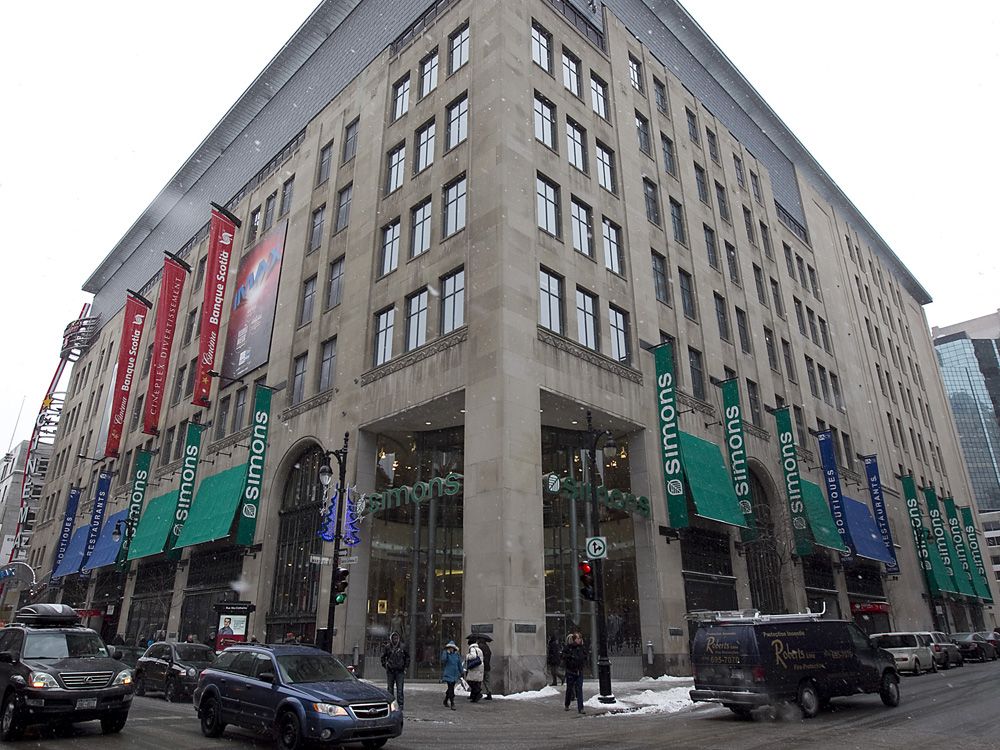Someone other than a Simons readies to lead Canada’s oldest private firm through pandemic’s aftermath

‘I view it very much as a rebirth,’ says CEO Bernard Leblanc. ‘We’re starting to dream again, which feels good’

Article content
Things are looking up at La Maison Simons Inc., the Quebec City-based retail chain known for its fashion-forward offerings.
Advertisement 2
Story continues below
Article content
Thanks to some pre-pandemic investments in e-commerce, Peter Simons, the chief executive, said the business that has been in his family for five generations was ready when retail went exclusively online in the spring of 2020. It wasn’t always easy, but the company survived an event that forced weaker retailers into bankruptcy.
Simons found himself pondering the company’s future. Even though he thinks the company is poised to do big things, he made a choice that might appear counterintuitive: He decided to step down. While multiple factors influenced the decision, his biggest consideration was the longevity of a company that is now it its 182nd year. Few companies last that long, and even fewer family enterprises make it to the fifth generation.
Advertisement 3
Story continues below
Article content
The current steward of the Simons legacy decided the time had come to look outside the family. “Everyone knows the numbers for all firms, and family firms in particular,” Simons said in an interview on March 22.

It’s a maxim that family businesses rarely survive beyond the third generation. “That three really is a curse,” Paul Desmarais III, heir apparent to the Power Corp. fortune assembled by his grandfather, father, and uncle, said at an event hosted by the Financial Post in 2019. “I think about it everyday.”
Almost every culture has saying for it. The Scots observe that, “The father buys, the son builds, the grandchild sells, and his son begs,” and the Japanese say, “rice paddies to rice paddies in three generations.” To be sure, ubiquity doesn’t make something true. The three-generation rule has been called into question by academic research in recent years, and some argue that family ownership might be an be an advantage.
Advertisement 4
Story continues below
Article content
“The unique dynamics, structure and pivotal role of the family can help make these business better able to navigate and adapt to crises like a global pandemic, for example,” said Mary Jo Fedy, an expert in privately held businesses and succession planning at KPMG, the global business consultancy. “They also tend to look beyond short-term profits and have a longer-term mindset.”
It’s not about me and my brother anymore. It’s about being of service to the company
Peter Simons
Regardless, Simons decided he wasn’t taking any more chances with his great great grandfather John Simons’ legacy. “It was time to maybe put the ego aside and be proactive,” he said. “It’s not about me and my brother anymore. It’s about being of service to the company … and looking 25 years ahead.”
So, earlier this month, Simons promoted Bernard Leblanc, the company’s chief operating officer, to CEO, and demoted himself to the role of chief merchant, overseeing buying and sourcing across the company. (Simons and his brother, Richard, remain controlling shareholders.)
Advertisement 5
Story continues below
Article content
“Excited and optimistic about the future,” Leblanc, a former Bombardier Inc. executive, said in a separate interview. “There’s certainly an element of pressure that comes with it.”

Simons began as a dry goods store in Quebec City in 1840, making it Canada’s oldest private company. The fact that it has thrived for so long under family control makes it an outlier. Family businesses often make the mistake of appointing a mediocre leader from the family, rather than from the broader talent pool, according to Robert Sher, founder of Mastering Midsized, a consulting firm that advises medium-sized business. “Leadership inbreeding” is also a threat, Sher wrote in an article for FamilyBusiness.org; this is where the older generation denies the younger generation the outside mentorship they need to take the helm of the business.
Advertisement 6
Story continues below
Article content
“Families have a visceral connection to the business that is not transactional,” Simons said. The character of the family is inextricably tied to the character of the business, because it’s not just a business – it’s part of their heritage. “When you’re family, you want to build a company where you can go home every night and see your children and you’re proud of what you did today,” Simons said.
With generational succession in mind, family businesses tend to take the long view. They make financial decisions that might not make sense in the short term, but will likely pay off in the long term. At the outset of the pandemic, Simons maintained this long-term approach. “We took care of our suppliers and we took care of our employees,” Simons said. “We didn’t always make the best short-term financial decisions for the company but we made it through…I don’t know if that was good or right or we just got lucky. There’s a lot of luck in business.”
Advertisement 7
Story continues below
Article content
Families have a visceral connection to the business that is not transactional
Peter Simons
There’s a lot of bad luck, too. The family behind McCain Foods Ltd. split acrimoniously over succession, and tensions within the Rogers family burst into public view last year as Ted Rogers’s heirs fought over control of Rogers Communications Inc.
Deciding on a CEO appears to have gone much more smoothly at Maison Simons.
When outside management is brought on board, there can sometimes be a breakdown in communication between family and corporate, said Simons, who was speaking generally about how succession can go wrong. In his new role as chief merchant, Simons said hopes to continue to serve as a bridge between the two.
There will be plenty of work for both the CEO and the new chief merchant officer.
Like so many other companies, Maison Simons is rethinking its supply lines. The past few years have featured railroad blockades, railway strikes, all the supply disruptions that came with the pandemic, and now the fastest inflation in more than three decades. So far, the company has muscled through, thanks to strong relationships with its suppliers, but there’s no obvious end to it.
Advertisement 8
Story continues below
Article content
-

‘This is out of Shopify’s hands’: Silicon Valley data fight could pose problem for e-commerce giant
-

Burger King says rogue franchisee won’t shut down Russian restaurants
-

Hudson’s Bay considering a bid for U.S. department store Kohl’s: report
Inflation and supply chain issues, “are the biggest elements that keep us awake at night right now,” Leblanc said. “We don’t have all the answers yet but we’re monitoring the situation very closely.
Shipping costs are 10 per cent higher than they were two years ago, so something will have to give. “In some places we’ve had to raise prices, and in other places, we’ve been able to keep it under control,” said Simons. “I think we have a unique way that we conceive of value and how we create it.”
Advertisement 9
Story continues below
Article content
Despite the challenges that lie ahead, Simons is optimistic about the future. He sees potential to grow the brand’s image outside of Quebec, home to nine of its 15 locations. The company has two stores in Ontario, three in Alberta, and one in British Columbia. “The awareness of who we are and what we bring to the landscape is not strong as compared to Quebec,” Simons said. “I see that as an opportunity and a challenge.”
Leblanc sees his appointment as a new beginning.
“I view it very much as a rebirth,” he said. “We’re starting to dream again, which feels good.”
• Email: [email protected] | Twitter: marisacoulton
Advertisement
Story continues below








